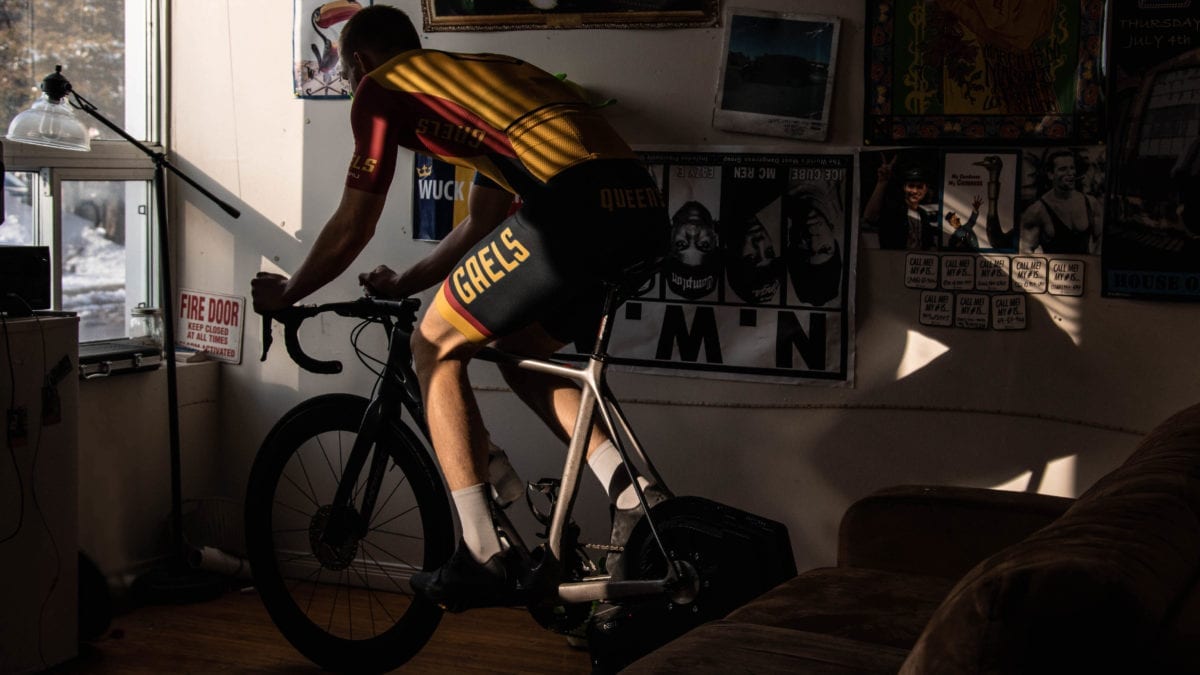Canadian university cycling teams are finally getting the chance to race each other
The Canadian Collegiate Cycling Association's Virtual Championship Series will get students and alumni racing every weekend in March
 Photo by:
Lyle Porter
Photo by:
Lyle Porter
For university students, the pandemic has been a hard experience. Classes are online, socialization is minimal and extra-circulars are mostly cancelled. Many cyclists attending Canadian Universities haven’t had the chance to ride, train or race with their collegiate team for almost a year.
Despite all the negatives, an exciting new opportunity for Canadian collegiate cyclists has presented itself during the pandemic. The newly formed Canadian Collegiate Cycling Association has come together to host its first ever event: A virtual race series.
Canadian Collegiate Cycling Association
“Ontario is lucky enough to have the U-Cup mountain bike series, but other than that there isn’t any organization in Canada that connects collegiate teams,” says Ben Ernewein, president of the Queen’s Varsity Cycling Club and fourth year of civil engineering student. “For the road season, most of the teams go to the States to compete in the American divisions.”
In Canada, many of the university cycling teams aren’t recognized as varsity clubs. Without the sports funding of many American universities, it’s easiest for the Canadian groups to compete within the existing cycling conferences of the States.
 Henry Dowd and Mel Wong of Queen’s Cycling Club. photo: Queen’s Cycling Club
Henry Dowd and Mel Wong of Queen’s Cycling Club. photo: Queen’s Cycling ClubThe push for a Canadian division started with the previous president of Queen’s Cycling Club, Chris Hatton. “The idea was to have a student-run organization that connects teams and promotes post-secondary cycling in Canada,” says Ernewein. Organizing a race is a major undertaking, particularly for clubs with small budgets, but, as the number of cyclists training indoors exploded in 2020, an opportunity presented itself.
“After chatting with other teams we thought that a virtual race series was the perfect event to launch the CCCA and turn the idea into reality,” says Ernewein.
The CCCA race series
“The Virtual Championship Series was started as an idea to make up for the lack of collegiate racing this year,” says Ernewein. While he says it’s not a replacement for outdoor racing, it is a way to maintain motivation and, “test the legs against other schools.”
“The pandemic has definitely changed the way collegiate clubs have operated,” he says “There have been a lot of solo miles and training sessions this year, which has been tough since the social aspect is such a big part of our sport.”
When Queens Cycling Club reached out, Cycling club members from eight schools across Canada enthusiastically came together to quickly organize the online race series, which will take place (virtually) on the local roads of four Canadian universities.
Four weekends, nine races
The CCCA is hosting the events on RGT cycling, a free platform that allows users to upload .GPX files to map a virtual course. Turns and elevation profiles of the routes are mapped onto a generic looking country road, which mimics the route of the .GPX file.
The first weekend of racing, March 6-7, a criterium and road race will take place in McGill’s territory—downtown Montreal. The second weekend, March 13-14, cyclists will race a time trial and road race through some of the University of Toronto Road Racing club’s favourite routes. The third weekend, March 20-21, UBC’s cycling team will bring riders to the west coast for a criterium and road race. Finally, March 27-28, Queen’s Cycling Club is wrapping up the series with a Kingston time trial, criterium and road race.
 photo: Lyle Porter
photo: Lyle Porter“The biggest benefit [of the Virtual Championship Series] is being able to race clubs from all across the country,” says Ernewein. “In normal times, teams from BC, Ontario, and Quebec would not be able to race each other four weekends in a row, but with virtual racing that’s possible. I also think virtual racing is generally more accessible. All you need is a bike and power meter. Travel, race fees, and expensive equipment are non-factors.”
The races won’t just be students—alumni of the schools are welcome to join as well, though their results won’t count towards the final standings.
The future of CCCA
“Overall, the cooperation and shared excitement between teams have been great,” says Ernewein. He sees endless long-term possibilities for the newly formed CCCA. “I could see the CCCA being a catalyst for more collegiate racing in Canada. I think if you ask any collegiate rider or alumni they would have good things to say about their time on their respective teams. Personally, I have had some of my best university experiences and have met some of my best friends through the team. Really, what it comes down to is giving more people that opportunity.”
For now, the focus is on bolstering Canadian collegiate cycling. “For the near future the CCCA is going to be all about growing the collegiate scene in Canada and highlighting the achievements of clubs across the country,” says Ernewein. “There are still a number of big schools without any cycling clubs which would be great to see change, and we’d love to help out with that.”
For more information on how to support and help develop the CCCA email canadiancollegiatecycling@gmail.com or contact the newly formed group on Instagram
